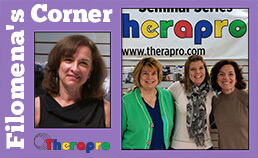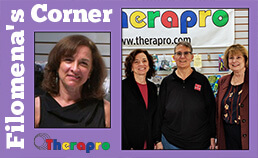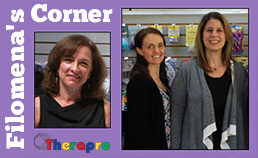
On March 16th, therapists and teachers formed teams to learn new games and how to adapt them for those with whom they work from preschool age and up. Allyson Locke, MS, OTR/L presented the seminar Games, Games, Games: Unique Adaptations of Games for All Ages and All Abilities. She discussed how the games can be used as part of the therapeutic process as well as how they can be used to target educational goals.
Allyson’s expertise with adapting games comes from her extensive and diverse background in both sensory integration and school-based practice. She currently works in a Massachusetts school for children and young adults who have significant medical, mental health, and cognitive needs.
Allyson chose 5 Therapro games to discuss in her presentation, followed by hands-on game time. The games included NOVENOPS, Letter Treasure Hunt, A Fist Full of Coins, Obstacles, and Left Center Right Dice Game (LCR). Attendees rotated every 15 minutes from one game to another. They reconvened as a group to discuss possible modifications of the games in order to meet a student’s needs. Letter Treasure Hunt, created by author and occupational therapist, Jenny Clark, has many adaptations for playing built into the game. It also includes suggestions for variations of playing the game within the game directions. The game includes a Captain’s Log for writing acquired treasures, for which a variety of pencil grips can be trialed. Allyson discussed a variety of multisensory activities for writing letters, i.e. Wikki Stix, Squiggle Writer, scented markers. Children can play in teams or individually to target cooperative and social skills. There are endless variations to try! During the game, players draw a Captain’s Orders card that features a motor activity they must perform.
Allyson provided a peek at a number of other games that will be discussed in Therapro’s first-ever webinar: Games, Games, Games: Unique Adaptations of Games for All Ages and All Abilities, Part 2. Be sure to keep an eye out for an announcement for this webinar in the Therapro’s e-newsletter (Theragram), and on the Therapro website.
All of the games presented were unique, motivating, and adaptable in many different ways, depending on the players’ needs. As therapists and educators, we are trained to develop strategies that ensure that children learn and succeed in achieving goals. Making learning fun is what motivates students of all ages!
Attendees enjoyed this interactive seminar! Here’s what they had to say:
“I liked exploring various games for different skill/age levels.” – Laurie K., Occupational Therapist
“It was fun to move around and try things.” – Rolene K., Teacher
“I enjoyed exploring the games while brainstorming & discussing how to adapt/grade each game to meet the needs of various students/clients.” – Shannon A., Occupational Therapist
“Surprised me that it would apply to my preschool class. Very good. Lots of fun.” – Anonymous, Teacher
“Great intro to available OT focused games!” – Inibral D., Occupational Therapist
Thank you, Allyson!
Filomena Connor, MS, OTR/L
March 16, 2019


